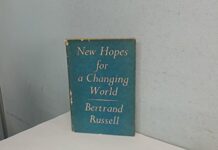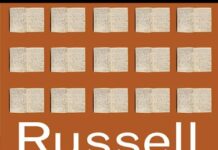
Ebook Info
- Published: 2014
- Number of pages: 116 pages
- Format: PDF
- File Size: 1.21 MB
- Authors: Bertrand Russell
Description
One of modern history’s great thinkers takes on prejudice, superstition, and conventional wisdom, using wit and insight to argue for a rational way of life. In a brilliant series of essays, Bertrand Russell uses challenging skepticism and sharp humor to attack the obstacles to building a society based on reason. Russell’s thoughts are as lively and pertinent today as when they were written. His topics range from the defects of the education system to the failure of the belief among the younger generation, from our mistaken concepts of democracy to the ever-present threat to freedom throughout the world—even in the West which prides itself so much on being free.
User’s Reviews
Reviews from Amazon users which were colected at the time this book was published on the website:
⭐Grate book!
⭐Published in 1958, reprinted in 1986, THE WILL TO DOUBT by Bertrand Russell has a great analysis of Fichte’s “Addresses to the German Nation” of 1807 on pages 93-98 in an essay called “The Ancestry of Fascism.” Still, this book already shows some capacity to outlive its moment in time. Jokes have a short life span, but the underlying incongruities that make some concepts funny keep cropping up, whenever a comedian looking for new material in current events casts an eye back to the classic approach for undercutting pompous views that Russell frequently referred to as religious. There is certainly no indication in THE WILL TO DOUBT that the concept *Jewish settlements* was considered funny in 1958, but the approach which Russell recommends for thinking through spurious attitudes seems to work just as well as any jest against the idea that *Jewish settlements* will ever settle anything.First essay: “Can Men Be Rational?” (pp. 9-16). After stating “I have a very high respect for psycho-analysis, and I believe it can be enormously useful,” (p. 12), Russell suggests: “A closely similar method can cure the irrationalities of those who are not recognized lunatics, provided they will submit to treatment by a practitioner free from their delusions. Presidents, Cabinet Ministers, and Eminent Persons, however, seldom fulfil this condition, and therefore remain uncured.” (p. 13). Jewish settlements might be considered a symptom of whatever Russell would like to have cured in this case, as Jewish settlements only seem to become an issue when they exist someplace where they are set in the midst of their enemies. Having Jewish settlements is a reminder “that in such matters it is impossible to be objective, and that no method is possible except a tug-of-war between classes with opposite bias.” (p. 14). Russell would like to crumble this cookie by writing, “Education, the press, politics, religion–in a word, all the great forces in the world–are at present on the side of irrationality; they are in the hands of men who flatter King Demos in order to lead him astray.” (p. 16).Second Essay: “Free Thought and Official Propaganda” (pp. 17-37). By considering the Blasphemy Laws, Russell tells people what each country would like people to believe. “In America no one can enter the country without first solemnly declaring that he disbelieves in anarchism and polygamy; and, once inside, he must also disbelieve in communism.” (p. 18). Russell must have been feeling like he had been deported on those very grounds himself, after having a few too many ideas, wives, and sympathies with enemies foreign and domestic. Adding to the confusion: “There was a time when Protestantism seemed as wicked as Bolshevism seems now. Please do not infer from this that I am either a Protestant or a Bolshevik.” (p. 19). Russell is ready for a world in which “War would become impossible, because each side would realize that both sides must be in the wrong.” (p. 22).History is awful enough that certain people are sure to try something new to escape it, but this book has no way to keep people from forming Jewish settlements, if that is what they think will change things in the way they want them changed. Russell thought Einstein was lucky to come up with ideas in science instead of religion. “What would have happened if Einstein had advanced something equally new in the sphere of religion or politics? English people would have found elements of Prussianism in his theory; anti-Semites would have regarded it as a Zionist plot; nationalists in all countries would have found it tainted with lily-livered pacifism, and proclaimed it a mere dodge for escaping military service. All the old-fashioned professors would have approached Scotland Yard to get the importation of his writings prohibited. . . .” (p. 23). Russell managed to mention “Zionist plot” without asking whether the Bible might have any evidence on what a plot by Zionists could accomplish. Even Russell’s look at economics provides similar instances. “The tendency, which exists wherever industrialism is well developed, for trusts and monopolies to control all industry, leads to a diminution of the number of possible employers, so it becomes easier and easier to keep secret black books by means of which any one not subservient to the great corporations can be starved.” (p. 32).Intellectual servitude has such a long and distinguished history, it hardly takes a monopoly employer to impose uniformly servile views on employees when it comes to information about anything which does not pertain to making big bucks. Anti-discrimination law has stepped in to protect Americans from “The habit of considering a man’s religious, moral, and political opinions before appointing him to a post or giving him a job” which Russell called “the modern form of persecution, and it is likely to become quite as efficient as the Inquisition ever was.” (p. 33). On this point, Russell is afraid “even the most orthodox of us may find himself in a minority some day, so that we all have an interest in restraining the tyranny of majorities.” (p. 34). Any point of view that hurts both sides might be “due to moral defects as much as to lack of intelligence. But the human race has not hitherto discovered any method of eradicating moral defects; preaching and exhortation only add hypocrisy to the previous list of vices.” (p. 35). Knowing how much the world can now be fooled, all for the worse, leads Russell to the conclusion: “Credulity is a greater evil in the present day than it ever was before.” (p. 35). “Hence the increase in the circulation of newspapers.” (p. 36). The less people are capable of paying attention to who really uses their weapons of mass destruction, the more Russell begins to seem a bit quaint with his complaint: “The results of science, in the form of mechanism, poison gas, and the yellow press, bid fair to lead to the total downfall of our civilization.” (p. 36).
⭐Awsome
Keywords
Free Download The Will to Doubt in PDF format
The Will to Doubt PDF Free Download
Download The Will to Doubt 2014 PDF Free
The Will to Doubt 2014 PDF Free Download
Download The Will to Doubt PDF
Free Download Ebook The Will to Doubt





